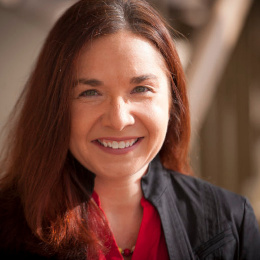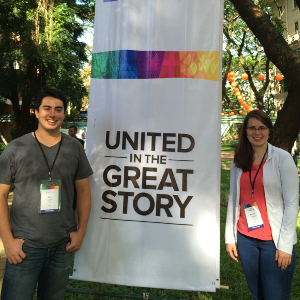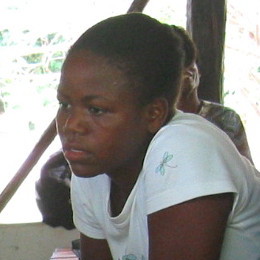Extinction Rebellion, eco-anxiety and Christian faith
‘Extinction Rebellion’ (XR) has been getting plenty of media coverage recently. It’s a new nonviolent, direct-action movement aiming to provoke discussion and transform the climate change agenda. In over 80 cities across 33 countries, XR has closed bridges and roads, protested outside fossil fuel companies, and seen hundreds of people arrested. When interviewed, most XR activists have spoken of their fear or eco-anxiety for the future, and their anger at the lack of action.
Extinction Rebellion block Marble Arch in London, April 2019. Photo: Brian Minkoff-London-Pixels (CC BY-SA 4.0)
Some Christians have chosen to get involved, but what is a Christian attitude to Extinction Rebellion? Apart from the question of whether or not it is right to break the law, even peacefully, which deserves a separate blog, should Christians feel eco-anxiety? My previous blog about eco-anxiety asked some key questions, including, are Christians protected from eco-anxiety because of Christian hope? Or do we feel doubly guilty if we despair?
I have in mind two recent comments by well-meaning Finnish Christians. First, a man in his fifties, remarked: ‘There’s something wrong with a person if he is not joyful. I want to choose eco-hope and not eco-anxiety.’
I am quite fond of joy myself, but I strongly disagree with this man. How would Job relate to such a statement?
There is a profound Biblical history of despair among believers. Some of the most moving verses in Scripture have been written about anxiety in the midst of darkness. I am thinking of several Psalms and of Jesus in Gethsemane. Perhaps the most profound hope is ‘hope in the dark’, to quote a timely book by Rebecca Solnit.
Two distinctions are crucial (literally; and I write this during Easter[i]). Hope is not the same as optimism. And despair is not the same as hopelessness.
With optimism, people make estimates of likely outcomes. But it is possible to hope without calculating probabilities. There is ‘hope against hope’ (Rom. 4:18). Vaclav Havel captures something of the essence of Christian hope: ‘Hope is not the conviction that something will turn out well; but the certainty that something makes sense, regardless of how it turns out.’ Hope is related to meaningfulness.
Despair is part of life. A despairing person may still have the capacity to act, perhaps with even more determination because of the desperate situation – and isn’t this what we are seeing with those who are prepared to get arrested with Extinction Rebellion? The true danger is hopelessness, which means a total lack of meaning.
[tweet_box design=”default” float=”none”]We live in desperate times, which call for desperate measures, but it is still possible to live in hope – and by hope.[/tweet_box]
The second, recent and well-meaning comment by another Finnish Christian is this: ‘Christians don’t need to feel anguish because of the environmental crisis. Why? Because faith in God is the most important thing in the world.’
St Paul captured a key tenet of Christian living: ‘Rejoice with those who rejoice; mourn with those who mourn.’ (Rom. 12:15) Even if Christians find daily joy and hope because of their faith, it is not fair to bypass the loss of so many creatures and the emotions of those who are anguished and cry out. We have a duty of mutual spiritual care. We have a profound possibility to be caregivers, but we are at the same time receivers; we share gifts which we have received ourselves. Often, we re-receive them through encounters with other creatures, human or non-human. Where two or three are gathered, the presence of Christ is strengthened (Matthew 18:20).
In industrialized countries, we suffer from loss of wisdom about the so-called negative emotions, such as grief, anger, and fear. It is not these emotions themselves that are ‘negative’. It depends on whether we manage, together, to channel them in non-violent ways (for example Miriam Greenspan, Healing Through the Dark Emotions), as the Extinction Rebellion movement seeks to do. Grief can lead to purification and a restoration of joy. Anger can be a key source of energy for non-violent activism. And fear can become a topic of discussion, instead of everyone feeling a vague anxiety. When fears are named and brought into daylight, we can work together to counter them.
There are profound gifts to be shared by Christians. I have personal experience of various sessions where people have been given a safe space to encounter their ‘Earth emotions‘. In fact, I have led such a session for people from Extinction Rebellion Finland; one of the strengths of XR has been that it has given attention to the need to encounter our dark emotions (see, for example, ‘The Aching Heart Movement’ of XR).
The results from such sessions have been deeply moving. Hope has been renewed by re-learning to cry (sometimes), to feel angry, and to feel despair. If Christians, in their communities and alongside their neighbours, can affirm that it is not a failure to feel dark emotions, great sources of energy are released. Instead of feeling guilt, we can even feel a rightful pride in our capacity sometimes to feel despair, because it is compassion which causes the despair. We share the sufferings and joys of a creation in travail, together with a God who truly knows Passion.
Author: Panu Pihkala (with additions by Dave Bookless)
[i] ’Crucial’ literally means ‘cross-shaped’, from the Latin ‘crux’, the root word for crucifixion.
We are happy for our blogs to be used by third parties on condition that the author is cited and A Rocha International, arocha.org, is credited as the original source. We would be grateful if you could let us know if you have used our material, by emailing [email protected].




[…] 2. Extinction Rebellion, eco-anxiety and faith […]